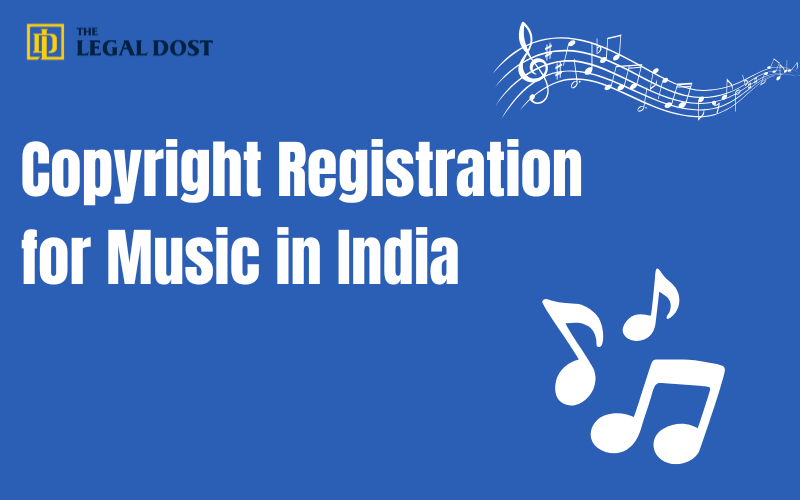In India’s rapidly growing music industry, protecting your original musical works is not just good practice — it’s a legal necessity. Whether you’re an independent artist, lyricist, music producer, or part of a record label, copyright registration helps safeguard your rights and ensures you maintain control over how your work is used.
This blog explains the process, benefits, and legal structure of music copyright registration in India in clear and actionable steps.
What Can You Copyright in Music?
In India, copyright protection applies to original works that are expressed in a tangible form. For music, this includes:
1. Musical Work
The melody, composition, or notated score, with or without lyrics.
Usually created by the composer or songwriter.
2. Literary Work (Lyrics)
The written words or poetic content of the song.
Owned by the lyricist or writer.
3. Sound Recording
The final recorded version of the song, including voice and instruments.
Usually owned by the record label, producer, or performing artist.
You can register each of these separately, depending on how rights are shared or licensed.
Why Register Your Music Copyright?
Under Indian copyright law, your work is automatically protected from the moment it is created. However, formal registration offers major legal advantages:
Proof of Ownership: Serves as evidence in court or disputes.
Public Record: Provides official recognition of your claim.
Enforcement Support: Easier to take legal action in case of copyright infringement.
Commercial Leverage: Enhances your ability to license, sell, or assign rights.
How to Register Music Copyright in India
Step 1: Go to the Copyright Office Portal
Visit the official website of the Copyright Office of India:
https://copyright.gov.in
Step 2: Create an Account and File Form XIV
Register as a user and fill Form XIV, the application for copyright registration.
You’ll need to select the type of work:
Musical work
Sound recording
Literary work (lyrics)
Each component should be registered individually.
Step 3: Submit Statement of Particulars and Statement of Further Particulars
These forms include:
Title of the work
Name and address of the author/owner
Language, year of creation, and publication details
Mode of creation and originality
Step 4: Upload Supporting Documents
This includes:
A copy of the music file (MP3/WAV for sound recording)
Sheet music or lyric sheet (PDF or text)
No Objection Certificates (NOCs) if multiple parties are involved (composer, lyricist, producer, etc.)
Step 5: Pay the Registration Fee
As of current guidelines (2025):
₹500 per musical work, literary work, or sound recording
Payment can be made online through the portal.
Step 6: Respond to Objections (if any)
After submission, there is a 30-day waiting period during which objections can be raised by third parties. If no objection is filed, the application proceeds smoothly.
Step 7: Certificate of Registration
If the application is accepted, you will receive a Certificate of Registration. This document officially confirms your ownership and is valid throughout the lifetime of the author plus 60 years.
Key Tips for Musicians and Producers
Register early: Especially before release or licensing your track.
Register components separately: This is especially important if different parties own the lyrics, music, or recording.
Keep your drafts and session files: They serve as useful evidence of original creation.
Use proper metadata: Tag your works clearly with ISRC codes, credits, and version details.
The Reverse Charge Mechanism (RCM) is a tax collection method under GST where the recipient of goods or services, instead of the supplier, is responsible for paying the GST directly to the government.
RCM applies to transactions such as legal services, goods transport agencies (GTA), e-commerce operators for certain transactions, import of services, and purchases from unregistered suppliers.
Yes, businesses can claim ITC on RCM payments. They must first pay the GST liability, report it in GSTR-3B, and then claim ITC in the subsequent eligible return.
Under RCM, businesses must pay GST upfront, which can create short-term cash flow constraints. However, they can later claim ITC to offset this cost.
Businesses must issue self-invoices, pay GST on applicable transactions, report RCM transactions in GSTR-1 and GSTR-3B, and maintain digital records as per updated compliance standards.
Failure to comply with RCM regulations can lead to higher penalties, interest on unpaid tax, and stricter audits as per the revised GST laws in 2025.
Key updates include expanded coverage of digital and gig economy services, automated verification for RCM payments, stricter penalties for non-compliance, and simplified ITC claim processes.


